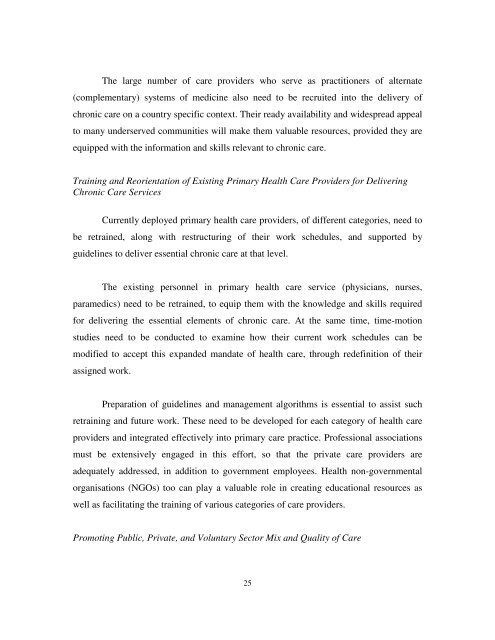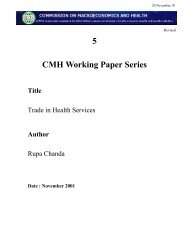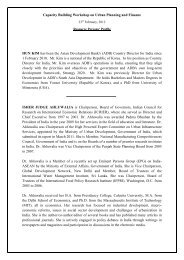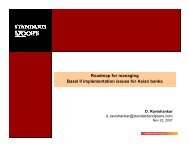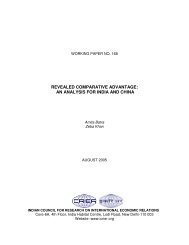prevention and control of non-communicable diseases - icrier
prevention and control of non-communicable diseases - icrier
prevention and control of non-communicable diseases - icrier
You also want an ePaper? Increase the reach of your titles
YUMPU automatically turns print PDFs into web optimized ePapers that Google loves.
The large number <strong>of</strong> care providers who serve as practitioners <strong>of</strong> alternate<br />
(complementary) systems <strong>of</strong> medicine also need to be recruited into the delivery <strong>of</strong><br />
chronic care on a country specific context. Their ready availability <strong>and</strong> widespread appeal<br />
to many underserved communities will make them valuable resources, provided they are<br />
equipped with the information <strong>and</strong> skills relevant to chronic care.<br />
Training <strong>and</strong> Reorientation <strong>of</strong> Existing Primary Health Care Providers for Delivering<br />
Chronic Care Services<br />
Currently deployed primary health care providers, <strong>of</strong> different categories, need to<br />
be retrained, along with restructuring <strong>of</strong> their work schedules, <strong>and</strong> supported by<br />
guidelines to deliver essential chronic care at that level.<br />
The existing personnel in primary health care service (physicians, nurses,<br />
paramedics) need to be retrained, to equip them with the knowledge <strong>and</strong> skills required<br />
for delivering the essential elements <strong>of</strong> chronic care. At the same time, time-motion<br />
studies need to be conducted to examine how their current work schedules can be<br />
modified to accept this exp<strong>and</strong>ed m<strong>and</strong>ate <strong>of</strong> health care, through redefinition <strong>of</strong> their<br />
assigned work.<br />
Preparation <strong>of</strong> guidelines <strong>and</strong> management algorithms is essential to assist such<br />
retraining <strong>and</strong> future work. These need to be developed for each category <strong>of</strong> health care<br />
providers <strong>and</strong> integrated effectively into primary care practice. Pr<strong>of</strong>essional associations<br />
must be extensively engaged in this effort, so that the private care providers are<br />
adequately addressed, in addition to government employees. Health <strong>non</strong>-governmental<br />
organisations (NGOs) too can play a valuable role in creating educational resources as<br />
well as facilitating the training <strong>of</strong> various categories <strong>of</strong> care providers.<br />
Promoting Public, Private, <strong>and</strong> Voluntary Sector Mix <strong>and</strong> Quality <strong>of</strong> Care<br />
25


